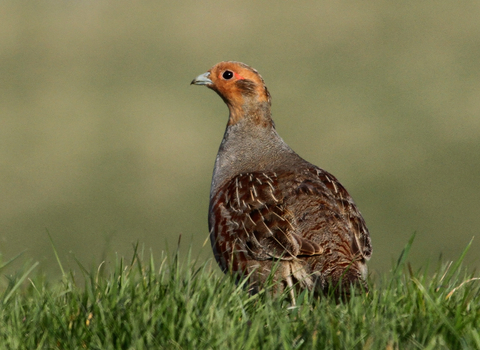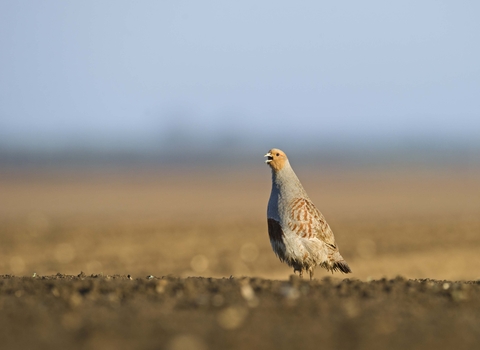
©Margaret Holland

Grey partridge ©David Tipling/2020VISION
Grey partridge
The grey partridge is an attractive bird that prefers the ground to pear trees! Found on farmland and grassland, it is under threat from loss of habitat.
Scientific name
Perdix perdixWhen to see
January to DecemberSpecies information
Statistics
Length: 29-32cmWingspan: 46cm
Weight: 390g
Average lifespan: 3 years
Classified in the UK as Red under the Birds of Conservation Concern 5: the Red List for Birds (2021). Priority Species under the UK Post-2010 Biodiversity Framework.
About
The grey partridge is common in parts, but is becoming scarce around much of the country. A farmland bird, it feeds on seeds, leaves and small invertebrates. When disturbed, it prefers to run instead of fly, but will fly low to the ground if necessary. It breeds in open scrub and farmland, close to hedges or other vegetation, laying its eggs on the ground in a grass-lined scrape.How to identify
The grey partridge has an orange face and black horseshoe-shaped patch on its belly. It is grey-brown above with a grey chest and orange-brown stripes down the flanks.Distribution
Found in England and the lowland parts of Scotland and Wales.Did you know?
Also known as the 'English partridge', the grey partridge is known for laying impressively large numbers of eggs. Females typically lay 13-16 eggs in a clutch, but some can lay up to 20!Watch
Grey Partridge Female (https://vimeo.com/444874658)
Grey Partridge Female by Tom Hibbert
